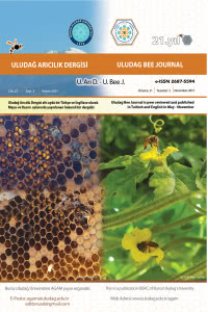Türkiye’de Varroa Destructor ile Doğal Enfeste Bal Arısı Kolonilerinde Apıvar®’ın (Amitraz) Etkisi
Bu çalışmada, Bursa yöresinde Varroa destructor ile doğal bulaşık olan balarısı kolonilerinde (polen tuzaklı kovanlarda) Apivar’ın (Amitraz) etkinliği araştırılmıştır. V.destructor ile doğal olarak bulaşık 40 koloni yirmişer koloniden oluşan 2 gruba ayrılmıştır. Birinci grup Apivar strip ile 6 hafta süre ile sonbaharda tedavi edilmiş, ikinci grup ise tedavisiz kontrol bırakılmıştır. Tedavi sonrası Apivar strip’in etkinlii istatistiki olarak Henderson-Tilton ve Yüzde Değişim Testleri ile karşılaştırılmalı olarak değerlendirilmiştir. Sonuç olarak Apivar grubunda polen çekmecelerine 42 günde toplam 8838 Varroa düşmüş ve bunların %57’si ilk 48 saatte tür. Kontrol grubunda ise polen çekmecelerine 42 günde toplam 1923 Varroa düşmüş ve bunların %13’ü ilk 48 saatte düşmüştür. Apivar’ın etkinliği ilk olarak Henderson–Tilton’un formülüyle, ikinci olarak tedaviden önce ve sonra arılar üzerindeki akarların ortalama yüzdesinin karşılaştırılması esasına dayanan yüzde değişim metoduyla tespit edilmiştir. Buna göre Apivar’ın etkisi sırasıyla %99.43 ve %99.36 bulunmuştur. İlaçtan kaynaklanan herhangi bir yan etki gözlenmemiştir
Anahtar Kelimeler:
Varroa destructor, Apis mellifera anatoliaca, Balarısı, Apivar, Amitraz
Efficacy of Apivar® (Amitraz) Against Varroa destructor Found on Naturally Infested Honeybee Colonies in Turkey
Goal: This study was carried out to compare the efficacy of Apivar (Amitraz) against Varroa destructor in naturally infested honeybee colonies with bottom pollen trap hives in fall season. Materials and Methods: Anatolian honey bee (Apis mellifera anatoliaca) was used to perform the experiments. In October-November 2009, forty colonies were divided into two groups (each group containing 20 colonies with pollen traps) in Bursa province. Before and after treatments, about 200 bees from outer frames were collected into jars containing cotton with diethyl ether to determine the infestivity rate of Varroa (Shimanuki and Knox, 2000). Aliquoted bees and mites were counted in petri dishes. The pollen trap hives with drawer (5 cm deep cov-ered with white paper) at the bottom were used with 3.5 mm screen to isolate falling Varroa mites from the bees. Varroa mites were counted for each colo-ny and groups will be equalized for Varroa mite level. Group one was treated with Apivar. The second group was kept as control. Varroa mites were counted on day 0 (before treatment), 1, 5, 7, 14, 21, 28, 35 and 42 in pollen drawers. Results and Conclusion: The efficacy of Apivar was detected from two formulas. One of them is Henderson –Tilton‟s formula: So efficacy of Apivar for Henderson–Tilton Formula was: n1= Mite count before treatment in control group n2= Mite count after treatment in treatment group n3= Mite count after treatment in control group n4= Mite count befroe treatment in treatment group Second Formula to detect effectiveness of Apivar is percentage changing method which based on differantiation of mean mite percentages on bees before and after treatment: n5= Percentage of mites on bees before treatment n6= Percentage of mites on bees after treatment So efficacy of Apivar for percentage changing method was: Importance between Apivar and control group was determined via one way Anova analysis and data were presented .There was a significant importance between Apivar and control groups according to statistic at level of 0.05. For Apivar group, 8838 Varroa mites were found in pollen drawers in 42 days and 57% of the fallen mites were dead in 48 hours .1923 Varroa mites were found in control group in pollen drawers and 13% of the fallen mites were found dead in pollen drawers. The efficacy of Apivar was determined by Henderson-Tilton method (Tutkun ve Ġnci 1985) and Second Formula to detect effectiveness of Apivar is percentage changing method which based on differantiation of mean mite percentages on bees before and after treatment. Efficacy of Apivar (Amitraz) were found 99.43 % and 99.36 % respectively. No side effects were observed on bees for Apivar.
Keywords:
Varroa destructor, Apis mellifera anatoliaca, Honeybee, Apivar, Amitraz,
___
- Akkaya, A., Vurusaner, C. 1997. Field experiment to determine the efficacy of flumethrin and coumaphos against varroasis according to the state of the honey bee colonies. Acta Parasitologica Turcica. 21(1): 83-86.
- Anderson, D.L. Trueman, J.W.H. 2000. Varroa jacobsoni (Acari: Varroidae) is more than one species. Acarology. 24: 165–189. and Applied
- Anonym, 2006. SPSS for Windows, Rel 15.0.0., SPSS Inc Chicago.
- Aydın, L.Girişgin, O. 2003. Arıcılıkta İlaç Kullanımı ve AB ile Uyum. II. Marmara Arıcılık Kongresi Bidiri Kitabı. Uludag Arıcılık Dernegi Yayın No: 2: 132–139, Uludag Üniv. Basımevi, Bursa.
- Aydın, L.Gülegen, E., Çakmak, I., Girişgin, O. 2007a. Occurence Of Varroa destructor (Anderson and Trueman, 2000) On Honey Bees (Apis mellifera ) In Turkey. Turkish Journal of Vetirinary and Animal Science. 31 (3), 189–191.
- Çakmak, İ.Aydın, L.Wells, H. 2006. Walnut leaf smoke versus mint leaves in conjunction Bulletin of Veterinary Institute in Pulawy, 50: 477–479
- Floris, I., Satta, A., Garau, V.L., Melis, M., Cabras, P, Aloul, N. 2001. Effectiveness, persistence, and residue of amitraz plastic strips in the apiary Apidologie. 32; 577-585. Varroa destructor.
- Girişgin, A.O., Aydın, L. 2010. Determining the efficacy of flumethrin (Varostop®) against to Varroa destructor in honey bee colonies in fall season. Uludag Bee Journal, 10(2): 70- 73.
- Hood, M. 2000. Varroa mite control in South Carolina. Entomology Insect Information Series 12: 1–7.
- Kumova, U. 2001.Varroa jacobsoni kontrolünde ülkemizde kullanılan bazı ilaçların etkinliğinin araştırılması. Turkish Journal of Vetirinary and Animal Science. 25, 597–602.
- Kumova, U. 2004. Varroa ile Mücadele Yöntemleri. II. Marmara Arıcılık Kongresi Bildiri Kitabı. Uludağ Arıcılık Derneği Yayın No: 2, 83–131, Uludağ Üniv. Basımevi, Bursa. Shimunaki H,Knox DA. diseases. of of honeybee Department Handbook No:690 States Agriculture, Agriculture
- Temiz, İ. 1983. Folbex VA ilacının Varroa parazitine karsı araştırmalar. Tarım ve Orman Bakanlığı Ziraat isleri Genel Müdürlüğü Ege Bölgesi Zirai Araştırma Enst. Yayın: 35 İzmir. üzerine
- Warrit, N., Hagen, T.A.R., Smith, D.R., Çakmak, I. 2004.A survey of Varroa destructor strains on Apis mellifera Apicultural Research 43: 4 190–191. Turkey. Journal of
- Zhang, Z.Q. 2000. Notes on Varroa destructor (Acari: Varroidae) parasitic on honeybees in New Zealand. Systematic and Applied Acarology Special Publications. 5: 9–14.
- Başlangıç: 2001
- Yayıncı: U.Ü.Arıcılık Geliştirme-Uygulama ve Araştırma Merkezi
